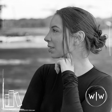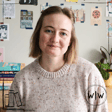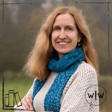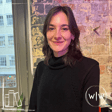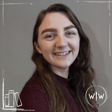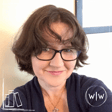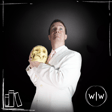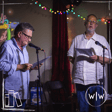Become a Creator today!Start creating today - Share your story with the world!
Start for free
00:00:00
00:00:01

233 Abi Fellows | Literary Agent
Literary agent Abi Fellows joins us this week to chat about her career in publishing, how she approaches queries and submission and a success story for one of her debut authors despite the current challenges in the industry.
Support the show on Patreon! 💖 And get extended episodes, ad-free and a week ahead of everyone else. 🙏
For audio listeners:
Listen to The Chosen Ones and Other Tropes, Jamie's other podcast with Melissa Welliver and Naomi Gibson! 📚
Follow on socials! 🥳
Transcript
The Role of Writing in Storytelling
00:00:00
Speaker
Ooh, a spicy question. love it. Because the writing is sort of everything, right? Like you can fix plot holes, but if the writer is there. So some readers love that and some readers are like, but I wanted more of this. So it's kind of, it's kind of a gamble.
Guest Introduction: Abby Fellows
00:00:14
Speaker
Hello and welcome back to the Right and Wrong podcast. On today's episode, I am joined by a literary agent who has worked across many different parts of publishing and was shortlisted for the British Book Awards Literary Agent of the Year in 2023.
00:00:29
Speaker
It's Abby Fellows. Hello. Hello. Thank you for coming on. Oh, thanks so much for having me. No, such a pleasure. Let's jump right in.
Abby's Early Career in Publishing
00:00:38
Speaker
i'd love to hear a bit about you and your career. so um am I right in thinking that your first job in publishing was as a bookseller at Blackwell's? Yeah, that's right. Yeah, it was um actually working in the cafe in Blackwell's.
00:00:52
Speaker
oh And the manager of the bookshop quickly realized that I was a massive book reader. I was always talking to his staff about what they were reading. And ah he did one day he said, I think you're in the wrong bit of the shop. So i got As soon as I graduated, I moved over to the bookshop um and worked there for a bit over a year, I think. Yeah.
00:01:10
Speaker
Oh, wow. And then, so was it always your goal to work with books or in publishing? I dabbled with the idea of journalism for a bit, actually. um When I was in my last year of uni, I did a bit of work experience at The Big Issue and ended up, they were so short-staffed, I ended up writing a lot for them.
00:01:28
Speaker
um And I did some work experience at The Independent as well. But i just, sort of my first impression was that it wasn't really for me. I liked the writing, but I didn't like the environment, the sort pressure of it.
00:01:38
Speaker
um Not that agenting isn't pressurised at times, but yeah, I just, I mean, I think it was always going to be writing or books for me, yeah. Okay.
Career Path and Transition to Literary Agent
00:01:48
Speaker
So from what i saw online, you were at Blackwells in 2001. What was then the kind of path to you becoming a literary agent?
00:01:57
Speaker
I had so many sort of serendipitous moments, really. um None of it was planned. So I had, I was supposed to be moving to London. i was at Bristol for my undergrad. um And I had planned to move to London to do a master's.
00:02:09
Speaker
um But I was working. So i I took this bookshop job for a year in theory to save money, but that didn't really happen. And i so I think about two months before the end of that, um the Faber sales rep, so I built a really good relationship with the Faber sales rep because I just loved their books and she knew I would read any proof kind of immediately. and And she said to me that she was going on mat leave and that they wanted to talk to me. They wanted me to apply for her job.
00:02:35
Speaker
um which was you know just incredible. So I had this whole kind of what shall I do? you know shall i Shall I defer my master's? um Which I did. so i So I worked for Faber for a year and I was their sales rep.
00:02:46
Speaker
I think they call them account managers now and for all of the southwest of England. So I was basically driving around selling Faber books into bookshops. and And then once that year was up, I moved to London to see my master's and I went back to Blackwell's. um So I then worked for Blackwell's for about 18 months.
00:03:02
Speaker
um and was just sort of trying to to put the feelers out. I didn't know about agenting. um i think like a lot of people, I really wanted to be an editor. think that's the job that people have heard of.
00:03:13
Speaker
um And I was really lucky through Faber. I met a couple of agents and I had a very... um inspiring conversation with Claire Conville, who kind of just sat me down and said, you know, what do you want to do? And said she thought I'd make a cracking agent and to sort of think, consider that as well.
00:03:31
Speaker
um So I just, I said ah sent my CV out to a lot of agents and ah kind of got my first agenting job through that. It was just a kind of right place, right time moment where someone had a vacancy.
00:03:43
Speaker
So it was all a little bit, yeah, serendipitous is is the word, I think. Yeah.
Skills and Experience as a Literary Agent
00:03:48
Speaker
Yeah, it sounds like your first two roles, you basically were doing such a good job that someone said to you, oh, you should do this other role.
00:03:56
Speaker
nothing stuff into that Yeah, that's really nice. I think it's just you don't really know what the options are. And I think you you get an idea of what a role is like. um and claire and a couple of other people said you know agenting is is like you obviously love to read you like to talk about books but you've got a bit of that salesperson energy as well so you would get to edit as an agent but you also get to do the kind of pitchy smooth smoothie bit that you like to do so um yeah that sounded perfect Okay.
00:04:25
Speaker
And then, am I right in thinking that then you did some time as literary scout as well? I did, yeah. I i um i left the first agenting role I was in when I had my first child. um And I went to scouting with the formidable, wonderful Ros Ramsey.
00:04:41
Speaker
and Really just a brilliant way to kind of juggle everything as a new mum. And offered you know Ros offered me flexibility before people were doing that and remote working before that was a thing.
00:04:53
Speaker
Um, so it was just, ah it was brilliant for me. And it, and when I then decided to come back to agenting, it meant that i had this brilliant address book, had a really good list of contacts from scouting. Um, so yeah, I did that for, for about eight years.
00:05:06
Speaker
I think that's literary scouting might be one of the most unsung roles within publishing. Completely. It always amuses me. Like you said, most agents didn't know what a literary agent was when they like got into publishing. yeah But I feel like nobody knows what a literary scout is. They are not praised enough. Just for like for everyone listening, tell us a bit more about what a literary scout does and what their role is in the
The Role of Literary Scouts
00:05:30
Speaker
system.
00:05:30
Speaker
I mean, they work extraordinarily hard and they get virtually no credit for things. um So ah literary scouts are employed by ah publishers overseas um and also some of them work with TV and film production companies.
00:05:45
Speaker
And their role really sort of scouting the UK market. I'm sorry, UK scouts. um they're They're talking to editors and agents here and they're finding out what their really hot books are for the next year or so.
00:05:57
Speaker
And then they're reading them and they're reporting about them to their clients. um And really what it means is that, you know, so for example, if i have a book in the UK that UK editors are getting really excited about, the scout will tell their publishers in Germany, France, Japan, wherever, and hopefully give them a sort of heads up to acquire rights in their territory before other people do.
00:06:19
Speaker
um so they're reading a phenomenal amount, but also getting to know what what works for their clients um so that they can matchmake. It's a real sort of finger on the pulse kind of role. Completely.
00:06:31
Speaker
Yeah, completely. And it's there to kind of connect all these different um areas together, basically. yeah so So that an agent, I mean, there are agents that do multiple territories, but they're essentially there so that you as an agent can focus on your territory and that it's in someone else's hands to like promote that somewhere else.
00:06:49
Speaker
Yeah. Okay. Okay. Okay, very cool.
Return to Agenting and Diverse Client List
00:06:52
Speaker
um So then after that, you went back you went back to agenting at the Good Literary Agency and you were there for a few years and then couple years ago you joined DHH. That's right. Yeah, it'll be two years in September that I moved.
00:07:07
Speaker
Okay. So you mentioned, you mentioned initially you wanted to be, ah you thought you wanted to be an editor. yeah Now that you know so much more about the industry, is there still an inkling inside of you that thinks you might want to be an editor or is that all gone? Not at all.
00:07:23
Speaker
No, I really, I really, um you know, I love being an agent. I think it's the best job in the industry. um Yeah. we get i love I love editing. um I'm actually editing today, which is, it's just great to kind of carve out that time. And and often agents are the first editor.
00:07:39
Speaker
and But that's very different to what editors and publishing houses do. For me, the thing, the the reason I wanted to return to agenting was that I just really missed editing. being at the start of the process. um And then also just kind of the best thing about being an agent is you're kind of across it all. So, you know, you get to sit in on the publicity meetings and the marketing meetings and you talk to the salespeople.
00:08:02
Speaker
So you get to kind of have your fingers in lots of pies, but you're also the first port of call for the author. So I think that's a really nice way of for someone like me who I like a lot of variety in my work. So that suits me really, really well.
00:08:14
Speaker
Yes. And you you can't, there's definitely a correlation between um editors becoming agents yeah and and not the other way around. Yeah, true. That's why there's so many agents now, I think.
00:08:28
Speaker
Yeah, yeah, yeah, yeah. Moving on to your list and the authors you work with, um for everyone listening, what are the genres, what are the age groups that you represent?
00:08:41
Speaker
and My list is very, very, very broad. um So i always say I don't do picture books and that my list starts from sort of, um you know, starts from sort of middle grade.
00:08:51
Speaker
But I have done a couple of picture books, so it's not entirely true. I'm a bit of a never say never, but... primarily i do sort of middle grade and y a um and then add adult I do fiction and non-fiction. I i don't go i guess kind of the very commercial end of the market but I do really love like a rom-com, a book club book, um I love literary fiction, love doing non-fiction too, I've got some history, memoir ah so it's really really broad. I suppose the thing that has that sort defined my list when I was first building it was that I was at the good agency um so I had a focus on authors from backgrounds who've traditionally been sort marginalized by the industry and I wanted to bring that ethos with me when I moved agencies so that's still really at the core of what I'm doing but it but it can manifest itself in crime or
00:09:43
Speaker
um you know all over I don't I don't do um fantasy or sci-fi that's my kind of weak spot I've just never really read massively um in that genre so I leave other people to do that really well including my colleague Harry who's brilliant at it so yeah yeah it's it's pretty broad okay but you don't you actually don't do fantasy and sci-fi not like you don't do picture books No, I actually
Genre Trends and Preferences
00:10:06
Speaker
don't. And I was about to say don't do horror, but I have just sold something that's coming out this year, which is kind of horror light. it's It's kind of horror for people who are a bit scared of horror. Right, yeah, yeah. But I think... ah That's a growing ah genre, I think.
00:10:21
Speaker
horror because horror is being coupled with so many different other than just like cozy horror which is somehow a thing contradictory thing but a thing nonetheless yeah it feels like horror is one of those genres that's really being bundled in with other genres yeah and i think particularly in in like lgbtq plus publishing i think there's quite a lot of horror in that space and now i publish a lot of lgbtq plus writers but yeah not the horror side of things i just have to how own my limitations there's there's enough else to choose from Okay. Okay.
00:10:51
Speaker
Um, on the DHH website, there is one more in your do nots category. is it cookery? It is cookery. Yeah. Yeah. And is that a definitely no? what have you, are you about to confess you've just also published a cookery book? No, there's like there are a couple of people I've followed and on Instagram and thought, oh, maybe.
00:11:09
Speaker
um it's It's a quite different skill set, I think. And I don't, I mean, I'm sure if I got really excited, I could, I could find the editors and work it out. But I think I've got enough on my plate. So I'll leave that to other people.
00:11:21
Speaker
Okay. Okay. Okay. excuse ah But the hard no is a sci-fi and fantasy. Yeah. Okay. Great. Glad we cleared that up. Yeah. Um,
00:11:31
Speaker
in terms of fiction, nonfiction, how evenly split is that on your list?
Finding and Developing Non-fiction Authors
00:11:38
Speaker
I think it's fairly, I'm just looking at my shelf, I think it's fairly 50-50, but in any given year, varies. So during the pandemic, I really gravitated to nonfiction, partly because I was homeschooling my kids whilst having a full-time job. And it was more manageable to develop a proposal than it was to edit, you know, 350-page novel.
00:12:01
Speaker
um So then once, you know, the kids were back in school, I then sort of swung back the other way to fiction. ah But yeah, overall, I think it balances out about 50-50. Okay. Is that all through submissions? Or I know that with nonfiction, it can be, it's much more common for agents to reach out to people to to propose maybe writing something.
00:12:22
Speaker
Okay. Yeah, I have um a few people who I've, again, that's probably a 50-50 split in terms of what's just sort of come to me and and what I've gone after. So I do have a few clients who I was following on, on you know, primarily Instagram, um although I'm now getting quite into Substack. that's I'm losing quite a lot of time to that.
00:12:39
Speaker
ah So yeah, a few people who I did the whole, you know, have you thought of writing a book? and Which is really exciting. And I love that development of a proposal with someone where you kind of go from, you know, great social media posts to like, okay, but how how do we turn this into a book?
00:12:55
Speaker
That's always really good fun. Okay. What do you, when you're kind of, are you actively looking for a person to like fill a niche or is it more like you find a person and you think, oh, this person, maybe we could write a really cool book about X, Y, Z? It depends. I think there are a couple of things where I really was looking for someone. um A book i I worked on a few years ago now called The Yoga Manifesto by Nadia Ghilani.
00:13:19
Speaker
I was really conscious that like yoga has become this really expensive, really whitewashed, really sort of corporatized thing. oh yeah which is not how it started. And i and ah then I sort of saw that Nadia was talking about exactly that.
00:13:32
Speaker
So yeah, we hooked up and and i I was talking, ah I've been going through sort of ah like divorce and separation and navigating co-parenting. And I really wanted to find someone who was talking about that and just kind of giving people ah ah toolkit um to like how you how you go about that. And I just, yeah, I found this great guy on Instagram and I thought surely he's got a book deal already, but happily he hadn't.
00:13:55
Speaker
um He does now. so yeah, sometimes it is. Sometimes you just get wind of a conversation that's bubbling up. I think, yeah. and And, you know, there's other areas like I think it's climate activism. I really wanted something in that space, but I also knew it was quite competitive. So it'd have to be the right thing and it would have to stand out.
00:14:15
Speaker
um So, yeah, it's a kind of combination. Sometimes it's all gut instinct um and other times it's people finding me as well. Okay. Right. And is that exclusively a ah nonfiction thing? is have Have you ever done that? Or do people ever do that with fiction? Like you seek out someone and propose them writing a fiction novel?
Pitching Fiction and Non-fiction
00:14:34
Speaker
No, it does happen. there's actually like, there's a um a playwright that I'm talking to about a novel because I saw her play a little while ago and I absolutely loved it. um And I, and I just said, have you ever thought of writing a long form fiction? and And that's something she wants to explore.
00:14:50
Speaker
and And something that editors do as well, like I've had editors come to me and say they're looking for someone for a certain sort of plot. do i Do I have anyone on my books? um So, yeah, sometimes editors approach me with a pitch and ask if I've got anyone who might be a good fit for that.
00:15:04
Speaker
um And that can be a really nice way for someone to get an in um because it's such a gamble writing a whole novel and not knowing whether it will sell. Yeah. Which I guess is one of the safer things in some ways about nonfiction is that yeah your proposal doesn't require you to have written the whole thing.
00:15:21
Speaker
Yeah. And also you, you it's much easier if an editor says, I love this, but I want it to be more X, Y, It's much easier to make those changes and, yeah you know, get a deal.
00:15:31
Speaker
Yeah. Especially because you won't be as attached to any kind of non-fictional characters and stuff. Yeah. True. Um, Before we head over to the desert island, always just want to ask, so it's currently ah June 2025.
Current Interests and Representation in Literature
00:15:50
Speaker
Are there any genres, settings, characters, or whatever it might be that you are particularly on the lookout for to add to your list at the moment?
00:15:58
Speaker
Oh, I'm really in the market for a good rom-com, preferably a queer one, but it doesn't have to be, but just characters we haven't seen. um It's been a little while since I've had a rom-com to sell. So yeah, that's on my top of my wish list at the moment. um And also like for adult, but also for YA.
00:16:14
Speaker
But otherwise, yeah, and maybe a bit more crime. I haven't haven worked on crime for a little while um and I do a bit of sort of historical crime and and the more literary end of crime. So it would be nice to have something new in that space as well.
00:16:26
Speaker
Okay. Yeah. Yeah. That's good. Nice and specific. Are rom-coms, um, are kind of doing very well at the moment or is that more of a personal thing? You just fancy one? It's a personal thing. I mean, I think some, you know, the thing that everyone's chasing is a romantic and it has been for a while. But as we've said, fantasy is not my thing. So um I kind of I try not to be swept up in trends um because they change so quickly anyway. So I just keep doing my thing. And I think there's always a place for a really good rom-com, especially especially with sort more diverse characters as well.
00:16:59
Speaker
think we still haven't seen enough of those. Yes. And I mean, it seems unavoidable at this point that the saturation with Romanticy. Yeah.
00:17:09
Speaker
ah Yeah. yeah yeahve I receive a lot of publicity notes about and press releases about new just wall to wall Romanticy authors all coming out. And at a certain point, I'm like, this is, it has to be too much at a certain point. Yeah. Yeah. I think so.
00:17:25
Speaker
So. That brings us to the point where i ah take away all of your things, put you on a boat and ship you off and ask you if you were stranded on a desert island, Abby, with a single book, which book do you hope that it would be?
00:17:39
Speaker
I'm going to try and persuade you to let me have a series because I'm an agent and we always ask for more. Can I please take Armistead Maupin's Tales of the City? Okay. And then maybe just the sort of 9, 10, however many more follow-up books there are.
00:17:57
Speaker
Well, it's not the wheel of time. So I guess it's not that many books. I was really struggling because I was trying to think of a really big book that would kind of keep me going. um And I kept thinking about a little life. And then I just thought, what what devastating existence I'd have just rereading that for all eternity on my own, as much as I love it. Yeah.
00:18:15
Speaker
ah Yeah. Some people have taken really intense ah books before and I yeah thought, well, I mean, it's a brave choice, but I guess, guess they want to feel something when they're alone on their own. I suppose so. Yeah. um But yeah, perhaps you could smuggle in the entire series in a concealed within your person somewhere.
00:18:36
Speaker
Excellent. A fun choice. So is that, is that a series that you kind of grew up with or is that a series that just when you read it, it just really had a profound effect on you? So I think I read them when I first moved to London. So I was sort of my early 20s. And I really hadn't read very many books with queer characters, um which which is mad. So sort of, you know, growing up as a bisexual, I just, I didn't ever see representation in books or very rarely. I was a a big fan of and still am a big fan of Jeanette Winterson.
00:19:06
Speaker
and But the books were sort of few and far between, you know, compared to now, and we have so much. So that was just really exciting. And I ended up going to San Francisco just really to try and find Barbary Lane and stand by it. so And I think it would be – I haven't reread them. I always read the new ones when they come back. um But I think if I was stuck on a desert island, it would be really lovely to reread them. And I think that would it would be interesting to see how the characters – uh look to me now um you know 20 plus years on just how how like my feelings towards them have changed over that time as well yeah and i guess society's feelings towards those kinds of things because obviously like you say it's very different now than it was back then yeah definitely um i mean it must be exciting then yeah to see this huge boom in like queer and and like lesser known voices in publishing
00:19:55
Speaker
Yeah, it's amazing. But I'm really like, struggle to keep up. And it's a it's a lovely, lovely problem to have. But yeah, it used to be that I could kind of buy, you know, this year's hot gay book.
00:20:06
Speaker
Whereas now there are so many, i don't have an enough holiday to to kind of get through them all. But, you know, it's brilliant. and And I'm thrilled to see all these writers emerging in that space. Yeah, that's great. I mean, yeah, like you say, a ah good problem to have. Yeah.
Trends in YA and Market Saturation
00:20:19
Speaker
not enough time to read all of the things um next up we are going to get into some bits about queries cover letters all the fun submission things um and that will all be available in the extended episode which you can find at patreon.com slash right and wrong um is really really successful so ah try and tune out some of that negativity as well i think yeah i mean it was not that long ago that i remember everyone saying that no one was buying ya yeah uh and here we are with romantic being like heavily steeped in ya definitely new adult but yeah yeah there's lots of ya selling so yeah here we are definitely the cycles are getting quicker and quicker it feels like
00:21:03
Speaker
I think so. Yeah. Yeah. Yeah. Awesome. Well, thank you so much, Abby.
Conclusion and Contact Information
00:21:10
Speaker
That brings us to the end of the episode. It's been so fun chatting with you and learning all about your, your career and everything you've been up to in, in publishing and as an agent.
00:21:18
Speaker
Thanks for having me. It's lovely to talk to you And for anyone listening, if you want to keep up with what Abby is doing, you can find her on Instagram at Abby R Fellows. And of course, if you're interested in querying Abby or any of the team over at DHH, head over to dhhliteraryagency.com and you'll be able to find all of their bios as well as the um very important submission guidelines.
00:21:40
Speaker
And finally, to support this podcast, like, follow and subscribe. Join the Patreon for ad-free extended episodes and check out my other podcast, The Chosen Ones and Other Tropes. Thanks again to Abby and thanks to everyone listening. we will catch you on the next episode.

